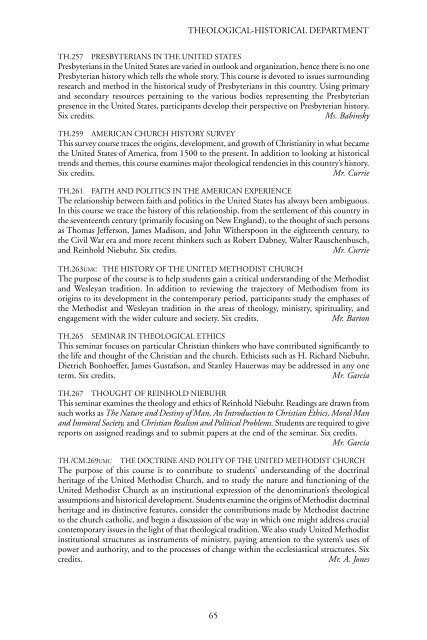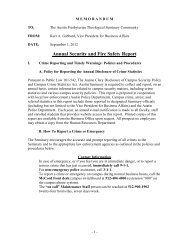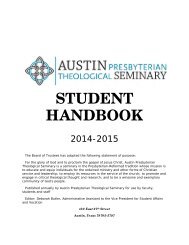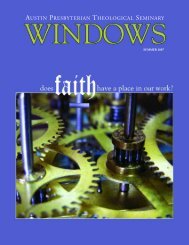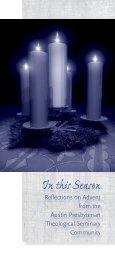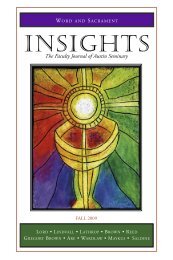Catalogue 2008 Book - Austin Presbyterian Theological Seminary
Catalogue 2008 Book - Austin Presbyterian Theological Seminary
Catalogue 2008 Book - Austin Presbyterian Theological Seminary
You also want an ePaper? Increase the reach of your titles
YUMPU automatically turns print PDFs into web optimized ePapers that Google loves.
THEOLOGICAL-HISTORICAL DEPARTMENT<br />
TH.257 PRESBYTERIANS IN THE UNITED STATES<br />
<strong>Presbyterian</strong>s in the United States are varied in outlook and organization, hence there is no one<br />
<strong>Presbyterian</strong> history which tells the whole story. This course is devoted to issues surrounding<br />
research and method in the historical study of <strong>Presbyterian</strong>s in this country. Using primary<br />
and secondary resources pertaining to the various bodies representing the <strong>Presbyterian</strong><br />
presence in the United States, participants develop their perspective on <strong>Presbyterian</strong> history.<br />
Six credits. Ms. Babinsky<br />
TH.259 AMERICAN CHURCH HISTORY SURVEY<br />
This survey course traces the origins, development, and growth of Christianity in what became<br />
the United States of America, from 1500 to the present. In addition to looking at historical<br />
trends and themes, this course examines major theological tendencies in this country’s history.<br />
Six credits. Mr. Currie<br />
TH.261 FAITH AND POLITICS IN THE AMERICAN EXPERIENCE<br />
The relationship between faith and politics in the United States has always been ambiguous.<br />
In this course we trace the history of this relationship, from the settlement of this country in<br />
the seventeenth century (primarily focusing on New England), to the thought of such persons<br />
as Thomas Jefferson, James Madison, and John Witherspoon in the eighteenth century, to<br />
the Civil War era and more recent thinkers such as Robert Dabney, Walter Rauschenbusch,<br />
and Reinhold Niebuhr. Six credits. Mr. Currie<br />
TH.263UMC THE HISTORY OF THE UNITED METHODIST CHURCH<br />
The purpose of the course is to help students gain a critical understanding of the Methodist<br />
and Wesleyan tradition. In addition to reviewing the trajectory of Methodism from its<br />
origins to its development in the contemporary period, participants study the emphases of<br />
the Methodist and Wesleyan tradition in the areas of theology, ministry, spirituality, and<br />
engagement with the wider culture and society. Six credits. Mr. Barton<br />
TH.265 SEMINAR IN THEOLOGICAL ETHICS<br />
This seminar focuses on particular Christian thinkers who have contributed signifi cantly to<br />
the life and thought of the Christian and the church. Ethicists such as H. Richard Niebuhr,<br />
Dietrich Bonhoeffer, James Gustafson, and Stanley Hauerwas may be addressed in any one<br />
term. Six credits. Mr. García<br />
TH.267 THOUGHT OF REINHOLD NIEBUHR<br />
This seminar examines the theology and ethics of Reinhold Niebuhr. Readings are drawn from<br />
such works as The Nature and Destiny of Man, An Introduction to Christian Ethics, Moral Man<br />
and Immoral Society, and Christian Realism and Political Problems. Students are required to give<br />
reports on assigned readings and to submit papers at the end of the seminar. Six credits.<br />
Mr. García<br />
TH./CM.269UMC THE DOCTRINE AND POLITY OF THE UNITED METHODIST CHURCH<br />
The purpose of this course is to contribute to students’ understanding of the doctrinal<br />
heritage of the United Methodist Church, and to study the nature and functioning of the<br />
United Methodist Church as an institutional expression of the denomination’s theological<br />
assumptions and historical development. Students examine the origins of Methodist doctrinal<br />
heritage and its distinctive features, consider the contributions made by Methodist doctrine<br />
to the church catholic, and begin a discussion of the way in which one might address crucial<br />
contemporary issues in the light of that theological tradition. We also study United Methodist<br />
institutional structures as instruments of ministry, paying attention to the system’s uses of<br />
power and authority, and to the processes of change within the ecclesiastical structures. Six<br />
credits. Mr. A. Jones<br />
65


